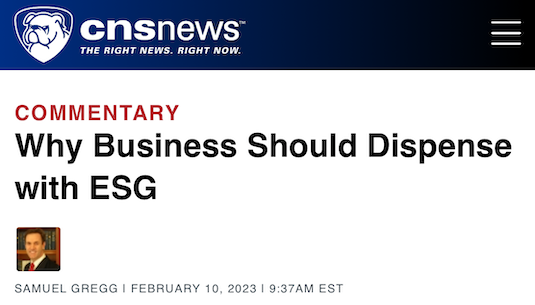Topic: CNSNews.com
 Just as the "news" side of CNSNews.com has been dutifully parroting right-wing talking points against investments that take environmental, social and governmental issues into consideration, CNS' more explicitly opinionated commentary side has done so as well, with content largely from right-wing think tanks. A Feb. 9 column by Kimberlee Josephson of the Consumer Choice Center -- which is funded by right-wing billionaires and climate deniers -- complained:
Just as the "news" side of CNSNews.com has been dutifully parroting right-wing talking points against investments that take environmental, social and governmental issues into consideration, CNS' more explicitly opinionated commentary side has done so as well, with content largely from right-wing think tanks. A Feb. 9 column by Kimberlee Josephson of the Consumer Choice Center -- which is funded by right-wing billionaires and climate deniers -- complained:
The adoption of ESG standards, however, is truly problematic given that value and virtue are difficult to measure and there will always be tradeoffs – whether Freeman likes it or not.
A troublesome matter for businesses serving societal goals rather than marketplace needs is the complexity of catering to all stakeholders at once, and the subjectivity of what is meant as being ‘good’ or when ‘good’ does or doesn’t apply.
Josephson's op-ed came via another right-wing think tank, the American Institute for Economnic research.
The next day, Samuel Gregg of the Acton Institute wrote in a column headlined "Why Business Should Dispense with ESG" insistoing that ESG investing doesn't do as well as regular investing: "This just isn’t bad for businesses; it also damages society’s wider capacity to recognize that when business achieves its proper ends, the wider, albeit indirect benefits for others are enormous." A Feb 13 column by Brian Gottstein of the Heritage Foundation toutted anti-EDG efforts in Indiana:
ESG seeks to shut out traditional energy producers like coal and natural gas from the marketplace to advance the Left’s climate alarmism agenda. And it infuses businesses with critical race theory and radical gender identity theories to advance the Left’s so-called social justice agenda.
This is not smart investing, and ESG measures often are in direct conflict with business and shareholder interests. ESG costs Indiana in investment profits and costs consumers in the form of higher energy, food, automobile, and gas prices when companies focus on political agendas rather than meeting their customers’ needs.
The ESG-bashing continueed:
- Josephson returned fort another anti-ESG attack in a Feb. 21 column: "So, although criticisms of ESG are on the rise, a pivot in portfolio management back to frameworks focused on corporate growth rather than cause-related ones seems unlikely. Both buyers and bureaucrats are to blame."
- Heritage's Anthony Kim huffed in a Feb. 27 column that "it should be remembered that economic freedom—not the environmental, social, and governance (ESG) agenda—makes America and the world cleaner, safer, and better governed. The true path to ensuring environmental, social, and governance improvements lies in focusing on policies that enhance economic freedom.
- Another AIER-linked writer, Peter Earle, proclaimed ESG investing to be over in a March 6 column: "Although it is unlikely to disappear completely, the ESG fad is probably past the crest of its popularity. It’s time again for firms to focus, singularly and completely, on the inestimable task of making money."
- A March 13 column by Josephson cheered the "backlash over ESG" while complaining that "The ESG industry, however, shows no signs of slowing down, and initiatives seem to be ramping up on a global scale."
CNS' attack on President Biden's reversal of Trump-era anti-ESG regulations was echoed in a March 28 column by Stephen Moore, another right-wing think tanker:
Workers and retirees are angry about this decision -- as they should be. ESG is effectively a tax on your retirement funds, and it means you will have a smaller nest egg when you retire than if the money managers simply bought the top-performing stocks. Workers don't want politics diluting the returns on their 401(k) plans and other pension accounts.
[...]
My estimate is that ESG has cost the public billions of dollars of reduced returns on their retirement nest eggs. This comes atop the $30,000 or so that people have lost on average in their 401(k) plans after Biden came into office, and the combination of high inflation and lousy stock market returns overall.
Yet another AIER-supplied column, an April 10 piece by Ramon DeGennaro, complained:
ESG proponents have no shortage of reasons to support their position. The current tide of popular opinion and the lure of being on the right side of history, though, can and should trigger cognitive dissonance by thoughtful ESG advocates. Companies that score high on some measures fall short on others. A willingness to focus blindly on one social issue to the exclusion of the rest makes proponents susceptible to the fads and fashion of the times.
ESG proponents also bear the risk that future generations may view their actions differently. Professor Thomas Sowell wrote, “If you have always believed that everyone should play by the same rules and be judged by the same standards, that would have gotten you labeled a radical 60 years ago, a liberal 30 years ago and a racist today.” Today’s virtue may indeed be tomorrow’s taboo.
DeGennaro's column was headlined "How Will Future Generations Look Upon ESG Investing?" He didn't wonder how future generations would look aboutright-wing efforts to restrict people from investing the way they would like.








